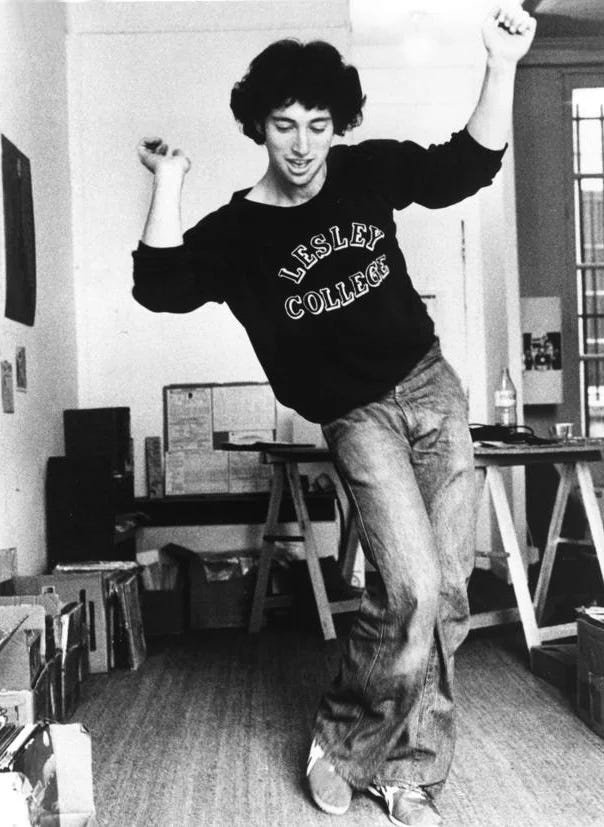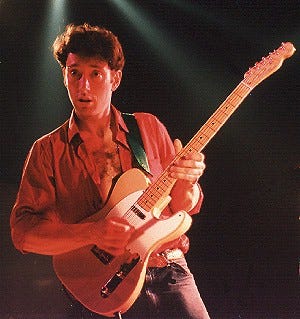The first time I ever saw Jonathan Richman perform was on Upper Sproul Plaza at U.C. Berkeley. It was about 1981 and I’d just transferred there; I used to cross the plaza on a daily basis, going between swim practice and home, and one day, poof! There he was, guitar in hand, playing “Pablo Picasso” or something.
I was rapt.
I knew who he was instantly for some reason – either because I read lot Creem, or maybe my brother told me, I don’t know. Jonathan was wearing blue suede boots and tight black jeans, which was not a normal outfit on the Cal campus in the early 1980s, and he had a beat-up acoustic guitar and he played a full set for spare change. He played one every day for a week and I went every day for a week and at the end of it I asked him if I could interview him for the Daily Cal and he said yes, and I did. It was my first ever rock ‘n roll interview. Greetings to the rest of my life!
I don’t remember anything about that interview except asking him about the boots, but I do recall my swim team friend and roommate Margee came with me to some of those shows and she loved him as much as me. She made him a large batch of her impeccable oatmeal raisin cookies and he said he really liked them.
Now at that time in my life, I was obsessed with Bruce Springsteen. (At least, I was until all the most awful frat guys on the water polo team sang “Thunder Road” all together one night during a kick-set at practice.) And for some dumb reason I saw Jonathan Richman and Bruce Springsteen as being more or less on the same plane. They were both rock ‘n’ roll legends and they had – or should I say have? – much in common. They were both of a similar age, both from the East Coast (I couldn’t tell a Boston accent from a Jersey one) and to me they even looked a bit alike.
Also, they sang/spoke songs about characters that were interspersed with funny patter, they used the same 4 chords, and performed in a way that was particularly physical. In my mind’s eye I can see them both now, Bruce, spreadeagled atop the amplifier stacks and shrieking “Rosalita;” Jonathan, on his hands and knees, being a little dinosaur
.
(Pictured: Jonathan and Bruce, around the same time.)
Looking back at that time, I remember being under a number of misconceptions though, about music – born of snobbery, ignorance, and all the dumb and opinionated magazines I read. For example, I once got in a huge fight with my friend’s boyfriend Nick because he insisted that Billy Joel and Bruce Springsteen were similar, and I was incensed by that position. But clearly Billy and Bruce had more in common than Jonathan and Bruce: Nick was right and I was wrong and I hope to God he is reading this because I would like to tell him so. (I was an awful brat in those days, and, as Jonathan sings on his new album, “I Had To See The Harm I’d Done Before I Could Change.”) Anyway, the point is that the real difference between the two can be summed up by the fact that at that time Bruce was releasing “The River” and JR was playing for spare change on Sproul Plaza, and that was an aspect I somehow didn’t even notice.
However. I was forcefully reminded of that moment last night whilst I was on my way to see Jonathan Richman perform at the Herbst Theater, because I’d just heard an ad for tickets for Bruce’s December show at the Chase Center, and a bunch of people I know had also been posting vaguely lukewarm reviews of his most recent show in Austin. (“The whole E Street Band, of course, put on a show that’s like watching the Navy SEALS do their job,” wrote one, which I could easily picture.) I have less than no interest in seeing Bruce at the Chase Center these days, and not just because of the $300 price tag, but $40 to see Jonathan at the tiny little Herbst is a different story.
(Detail of mural from inside the Herbst Theater.)
I hadn’t seen him in some three decades, and the set he played at the Herbst, drawing mostly on his latest album, “Want to Visit My Inner House,” contained only one song that I knew, but in some ways he was exactly the same he was at Sproul. Today he sings songs in different languages – French, Spanish, Italian and Ojibwe – and even used a tambura on a few, elements that really changed the tenor of the music and certainly made it seem like he’d grown and changed as an artist. But in other ways, his music was totally familiar, because it is made by him and he is just such a very singular human, a musical genius, a magical being, and a true philosopher king.
If you know his work, you know what I mean. He sings songs that are about nothing and everything: about cold pizza, for instance, or the experience of walking towards someone, and as he performs, as the songs get smaller and smaller and quieter and quieter, they simultaneously grow bigger and bigger in import. It’s like a magic trick. The subjects grow ever more intimate, until they are a mere speck, a mote in your eye, if you will, but it is that very mote that contains the entire universe. At his best, it is as if he distills the very essence of all music into this very quiet and tender place. Indeed, one song, he said, is about that moment when the music at a rave or a disco gets so loud that you suddenly find a still place, and go into a trance. Never have I ever driven down Thunder Road but I have been to that strange still place at the center of loud rock concerts again and again, and I went to it once over during Jonathan’s set at the Herbst, transported not by the clamor but by the actual silence in between the notes.
Even so, Jonathan still calls to mind Bruce Springsteen sometimes, even quoting lines from “Dancing in the Dark” and “The Promised Land,” — alongside Santana’s “Oye Como Va,” and King Harvest’s 1972 hit “Dancing in the Moonlight” (among other things.) But the similarity between he and Bruce is now very faint, and honestly, slightly amusing. The chasm between them that their musical histories have opened up is just so vast, an abyss that encompasses the entirety of the difference between mainstream music and the underground.
Or to put it another way, Jonathan invites you into his inner house; Bruce’s house is very much the exterior. But here’s the thing. At this show, Jonathan sang a song in which he described himself as a bratty kid in Harvard Square who is fortuitously offered keys to “open the door to Bohemia.” Bohemia is an imagined community, but it’s also very real, and you either want in to it or you don’t. Now that I think about it, it was Jonathan who opened that door for me, and once I was there, I looked back and I saw that other world of music for what it was, and I could never not see it again. Because you know who is NOT bohemian? Bruce Springsteen. He is many other things, an icon, a genius, and a legend, but he is also a man who never looked for those keys or wanted to open that door, not for a single second. He and his fans live in a different realm altogether, one now full of enormous homes on cul de sacs that have marble kitchens with giant islands in the center.
Not that there is anything wrong with such places. I might even want to live in one myself now, and anyway, striving to achieve them is more or less the subject of all of Bruce’s early works. But that’s why Bruce is playing the Chase Center for a kabillion dollars and why Jonathan is not. At the Herbst, Jonathan played for an audience who understood what he was all about in the very core of their being; in their solar plexus. We also knew we were lucky to be in his presence, and such things these days feel even more precious because so many such artists fall by the wayside.
Or as someone else once put it, two roads diverged in a yellow wood and I.
And I and I and I.








Interestingly, Jon Rubin from The Rubinoos who at that time (1981) were honorary Modern Lovers. (On record: It’s the Rubes backing Jo Jo on Government Center and New Teller…) Jon Rubin has gone on to me about the similarities. And where they start and stop. Yeah... Whatever… Either way, Jonathan always loomed large over everybody. Still does. You’ve seen the bumpersticker: WWJD. What Would Jonathan Do?
Such a wonderful post. I was never a Bruce fan (still don't get it although I don't hate him or anything) so the comparison was a bit surprising to me, but it does make total sense at some level. Both white dudes about the same age who grew up worshiping two very different '60s icons, Bob (in the case of Bruce) and Lou (in the case of Jonathan). And they took those ideas and went a looong away ahead into their art, making music for the ordinary people among us. Of course, Bruce's 'ordinary' was maybe a different kind of 'ordinary' than Jonathan. Anyway, I've only seen Jonathan a few times (last time, probably in the '90s) but each time was as if I was transported to a little cosmos of joy and hope and connections. Unforgettable concerts. (And I know Jonathan will never ever sing a song from the Modern Lovers debut album, but that album ensures Jonathan's place in my pantheon of awesome music of the 20th century).